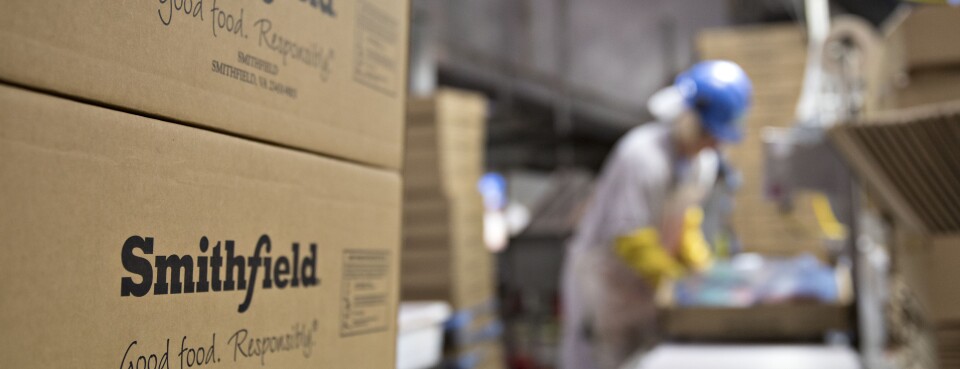
WASHINGTON POST, E.J. DIONNE
We talk incessantly about our appreciation for front-line workers in retail, delivery, food-processing and other sectors who allow the rest of us to live our socially distanced lives. Then we slap them in the face.
Item One: President Trump, who has largely declined to use his power under the Defense Production Act for needed medical and protective equipment, used that same power on Tuesday night to force meat processors to remain open.

Never mind that food-processing and meatpacking plants are hot spots for covid-19 — at least 79 have reported outbreaks. Never mind that at least 20 workers in the industry have died from the disease or that the United Food and Commercial Workers (UFCW) reports that at least 6,500 workers in the industry have been diagnosed or exposed.
And never mind that shutting down plants is often the only way local officials can force safety improvements to protect the larger community from the disease’s spread.

Item Two: Senate Majority Leader Mitch McConnell (R-Ky.), who offered the economically illiterate suggestion that letting states go bankrupt might be better than Washington giving them needed assistance, now wants to hold that help hostage. In return for aid, he wants Congress to place federal limits on lawsuits against businesses that reopen during the pandemic. During a national calamity, the McConnell Republicans choose to put a check mark on their corporate wish list by disempowering citizens confronting private-sector power.
Corporate interests, with the enthusiastic support of the GOP, have crushed unions. Now, McConnell wants to keep workers out of the courtroom. Notice a pattern? First, throttle worker power on one end. Then shut it down on the other. And to imagine that this administration will issue strong pro-worker regulations is like believing that Lysol really is a miracle cure for the coronavirus.

Items One and Two are linked. One of the few meatpacking facilities in the country where workers won some concessions on safety is a Smithfield plant in Milan, Mo. Why? Because the workers went to court. In response to a lawsuit filed by an anonymous employee of the plant and the Rural Community Workers Alliance, U.S. District Judge Greg Kays ordered the plant to follow federal safety recommendations while the case continued. Sorry, Mitch. Sometimes it takes a lawsuit to make things better.

The problem workers face, said Debbie Berkowitz, director of the worker health and safety program at the National Employment Law Project, is that while the Occupational Safety and Health Administration has provided “guidance,” it has so far “declined to issue any requirements” for coronavirus safety at the plants. The Centers for Disease Control and Prevention has also issued “guidance.” But Berkowitz noted that it’s “very vague” and “keeps getting vaguer.”
“Trump has created a false choice between worker safety and feeding America,” Berkowitz, who has spent decades working on safety issues in meat processing, said in an interview. “We can do both. Other parts of the economy are doing both.”

Medical workers walk the halls of Laurel Regional Hospital, a portion of which was reopened to treat covid-19 patients in Prince George’s, the county with the most coronavirus cases in Maryland. (Michael Robinson Chavez/The Washington Post)
And it’s not just meatpacking employees who find themselves at risk. An important report in The Post by Rachel Chason, Ovetta Wiggins and John D. Harden noted exceptionally high rates of coronavirus infections in Maryland’s Prince George’s County. One of the country’s wealthiest majority-black counties, it lies just outside Washington. One key reason for the high infection rate: “many residents are front-line workers exposed daily to the virus.”
Alan Hanson, mobilization director at UFCW Local 400, noted that many of his members face not only direct problems at work but also day-to-day challenges that confront all lower-income Americans. For example, those in the D.C. area often rely on public transit at a moment of reduced service. More crowded buses and trains defeat efforts at distancing.
And within the food industry itself, many facilities could be kept open safely if employers were willing to make concessions to the pandemic’s threat. “Poultry plants are dangerous places to work,” he told me, “but they can be made safer by slowing line speeds to allow for better social distancing.”
“We can choose to honor the sacrifice of essential workers by ensuring they have a living wage, paid sick leave and a safe workplace,” Hanson said, “or we can choose to give corporations who endanger their workers’ lives blanket immunity. Mitch McConnell has unapologetically chosen the latter.”
When social solidarity is essential, it’s common to hear pious sermons against class warfare. Unfortunately, there is a class war. And its victims, so many of them front-line workers, didn’t start it.